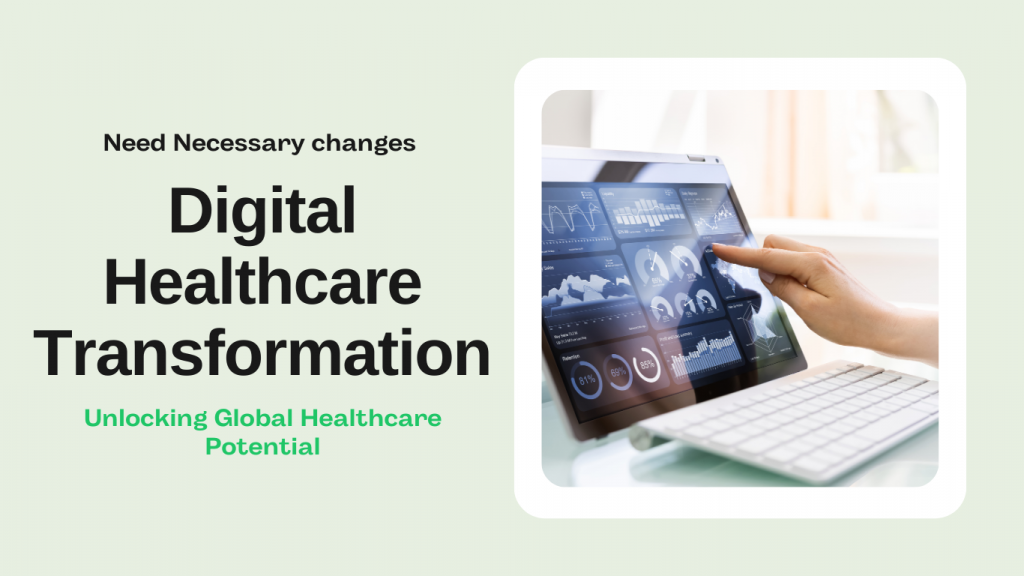
In an era where technology permeates every facet of our lives, the healthcare industry stands at a pivotal crossroads. Hospitals worldwide are recognizing the imperative need for digital transformation—not just as a competitive advantage but as a necessary evolution to meet the growing demands of global healthcare.
Why is Digital Transformation Important for Hospitals?
- Enhanced Patient Care: Digital tools enable personalized treatment plans, real-time patient monitoring, and improved diagnostic accuracy. This leads to better patient outcomes and increased satisfaction.
- Operational Efficiency: Automation and data analytics streamline administrative tasks, reduce errors, and optimize resource allocation, contributing to cost savings and increased productivity.
- Data-Driven Decisions: Access to big data allows hospitals to make informed decisions regarding patient care protocols, staffing, and investment in new technologies.
- Improved Accessibility: Telemedicine and mobile health apps extend healthcare services to remote and underserved populations, breaking down geographical barriers.
Benefits of Digital Transformation
- Patient Empowerment: With access to their health records and online portals, patients become active participants in their care journey.
- Collaborative Care: Seamless data sharing between departments and with external providers fosters a more integrated approach to patient care.
- Innovation Acceleration: Embracing digital technologies opens doors to cutting-edge treatments like AI-driven diagnostics and robotics-assisted surgeries.
- Regulatory Compliance: Advanced security measures protect patient data, ensuring compliance with international healthcare regulations.
Achieving Digital Transformation
- Strategic Planning: Develop a clear roadmap that aligns technological initiatives with the hospital’s mission and goals.
- Stakeholder Engagement: Involve clinicians, staff, and patients in the transformation process to ensure the solutions meet real-world needs.
- Invest in Training: Equip staff with the necessary skills to use new technologies effectively through continuous education and support.
- Collaborate with Tech Partners: Partner with technology providers who specialize in healthcare to implement robust and scalable solutions.
Essential Technology Solutions
- Electronic Health Records (EHRs): centralized patient data systems that enhance information accessibility and accuracy.
- Telemedicine Platforms: Tools that facilitate remote consultations, reducing the need for in-person visits.
- Artificial Intelligence (AI) and Machine Learning: Algorithms that assist in predictive analytics, diagnostics, and personalized medicine.
- Internet of Medical Things (IoMT): Connected devices and wearables that monitor patient health metrics in real-time.
- Blockchain Technology: Secure methods for data sharing and transactions, enhancing trust and transparency.
Global Perspectives
Healthcare systems around the world face unique challenges, from resource constraints in developing nations to aging populations in advanced economies. Digital transformation offers tailored solutions to address these issues on a global scale:
- In Low-Resource Settings: Mobile health initiatives can deliver essential services without the need for extensive infrastructure.
- In Advanced Economies: AI and robotics can alleviate the burden on healthcare systems strained by increasing demand.
- Cross-Border Collaboration: Global data sharing accelerates medical research and the rapid deployment of effective treatments during global health crises.
Conclusion
Digital transformation is not a destination but a continuous journey that hospitals must embark upon to remain relevant and effective. By embracing technological innovations, hospitals can revolutionize patient care, streamline operations, and contribute to a healthier global society. The time to act is now—healthcare leaders must champion digital initiatives to unlock the full potential of modern medicine with Medeilplus Cloud, an AI-enabled cloud hospital information system that helps hospitals achieve their goal with high-quality applications at the most economical cost.
Medeilplus Cloud is a state-of-the-art, cloud-based hospital management system that significantly accelerates the digital transformation of hospitals. By seamlessly integrating critical functions such as electronic health records (EHR), patient management, billing, inventory, and administrative tasks into a unified platform, Medeilplus Cloud enhances operational efficiency and data accessibility.
Its cloud infrastructure ensures that healthcare professionals can access real-time patient information securely from anywhere, fostering better collaboration and informed decision-making. Moreover, the scalable nature of Medeilplus Cloud allows hospitals to adapt quickly to evolving technological demands without the need for substantial upfront investments in IT infrastructure. This flexibility not only reduces costs but also enables hospitals to focus more on delivering quality patient care, embodying the true essence of digital transformation in healthcare.
